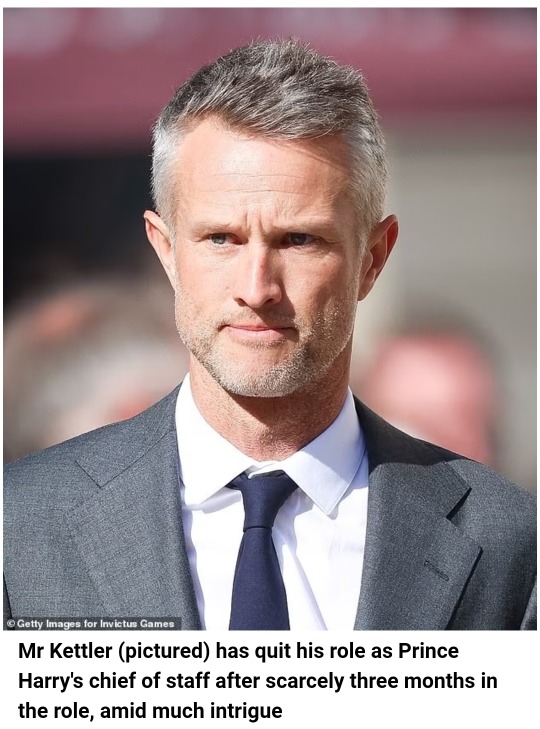#jobs in nigeria 2018
Text
John Kettler: Chief of The unSUCCESSFULS Invisible Staff


John Kettler is out after only three (3) months on the job. No sympathy for anyone who partners with these two (2) bullies. You're either too lazy to read a book or maybe you like to help bullies.

"Joshua lives with his wife in Santa Barbara, CA and holds an MBA from Clemson University with an emphasis on Entrepreneurship and Innovation."¹
Richard Eden for Daily Mail: When the Duke of Sussex appointed Josh Kettler as his grandly titled chief of staff earlier this year, it was said that he was the perfect man to 'guide' Harry 'through his next phase'. However, the Daily Mail understands that Mr Kettler has suddenly quit his job after scarcely three months, amid much intrigue. Josh Kettler is no longer working for them,' a source in California told this newspaper today. The timing is a particular blow to Harry and his wife Meghan as Mr Kettler would have been expected to accompany them on their 'quasi-royal tour' of Colombia, which kicks off this week."
The total number the Sussexes have lost since they married in 2018 is said to be at least 18, with nine or more having left since they moved to California in 2020.
Mr Kettler was seen entering St Paul's Cathedral with the duke for the anniversary service, which was attended by figures including Harry's uncle, Earl Spencer, but no other members of the Royal Family.
Later that month, Mr Kettler was a key figure on the Duke and Duchess of Sussex's three-day 'tour' of Nigeria and was by Harry's side as he met government officials in the West African country. His role on the visit was said to be a foretaste of what he would achieve in the future.
Prince Harry and Meghan with Mr Kettler (circled) by their side. His role on the visit was said to be a foretaste of what he would achieve in the future.
¹Bio: "Joshua Kettler is an experienced executive accelerator, organizer, and confidant. Seasoned in guiding C-suite functions, critical cross-functional program management, high-level strategy development, and board of directors / investor relationship management. Focused on bringing unparalleled products and experiences to customers while working in lockstep with leaders, executing on their vision.
Joshua spent the better part of a decade with Patagonia, a leader in outdoor apparel, serving as a trusted resource and right hand to the Vice President of Global Sales and Customer Experience. He helped direct all revenue driving strategies and operations worldwide, spanning seven major markets and $1B+ in yearly revenue. His efforts included managing the organization's workflow, prioritization, and oversight of regional GMs, while providing input on critical decisions including distribution strategy, customer touch points, internal and external communication, organizational structure, and personnel matters.
In 2021, Joshua shifted is focus to start up ventures, becoming Chief of Staff to the CEO of Better Place Forests and most recently joining Cognixion as Chief of Staff and Head of Strategic Partnerships, helping to accelerate and support the transformative AR / BCI company.
Joshua is an avid trail runner and skier, and a steadfast supporter of conservation and the environment. Joshua lives with his wife in Santa Barbara, CA and holds an MBA from Clemson University with an emphasis on Entrepreneurship and Innovation."
#markled#spare us#like a spare#megxit#chief of staff#revolving door#John Kettler#meghan markle is a bully#meghan markle is a liar#horrible bosses#archeFRAUD#pro tip: revenge by tom bower#valentine low
54 notes
·
View notes
Text
Have You Heard Of?

“A man who would be intimidated by me is exactly the kind of man I would have no interest in.”
Chimamanda Ngozi Adichie b.September 15, 1977
Chimamanda Ngozi Adichie is an award-winning author and an influential advocate of feminism. She has captivated people worldwide with her powerful storytelling and her outspoken campaign for gender equality.
She was born in Enugu, Nigeria, and was raised in an academic environment that surely nurtured her passion for writing. As one of six siblings she grew up in the university town of Nsukka, her Mother was the first female registrar at University of Masuka and her father was Nigeria's first professor of statistics, and later became Deputy Vice-Chancellor of the same university. She attributes her success in part to her parents for, encouraging her self-confidence and being supportive by always showing that they had confidence in her.
She began studying medicine and pharmacy at the university school her parents worked at; though, writing seems to have called to her, as she also edited the magazine created by the medical students. She left her medical studies after a year and a half when at nineteen she gained a scholarship to Eastern Connecticut State University in America, where she graduated summa cum laude (with highest honours) with a degree in communication and political science and continued her passion for writing by producing articles for the university journal.
She went on to gain her master’s degree in creative writing from Johns Hopkins University, become a Hodder Fellow at Princeton University, earned an MA in African Studies from Yale University, and she was awarded a fellowship by the Radcliffe Institute for Advanced Study, Harvard University.
During this time, she has released numerous novels, including A Feminist Manifesto in Fifteen Suggestions. She holds strong feelings regarding gender equality and is proud of her femininity, taking pleasure in fashion whilst grappling with the knowledge that she will be judged for the way she chooses to dress. Her belief is that you should be happy to be who you are, without being forced into a mould society has decided fits your gender. Refusing to conform to a female academic stereotype, she loves make-up and has been the face of Boots No7 cosmetics. Now married with a daughter, she splits her time between Nigeria, where she teaches writing workshops, and the United States.
All in all, Chimamanda Ngozi Adichie is a world-renowned writer, acclaimed academic, fashion icon, beauty queen and a feminist warrior we all should have heard of.

“If you criticise X in women but do not criticise X in men, then you do not have a problem with X, you have a problem with women.”
Books and Novels






Notable Awards and Honors
35 awards, 21 are literary awards, including:
Future… Award (Young Person of the Year category), 2008
Global Hope Coalition's Thought Leadership Award, 2018
Action Against Hunger Humanitarian Award, 2018
UN Foundation Global Leadership Award, 2019
Africa Freedom Prize 2020
Business Insider Africa Awards, 'Creative Leader of the Year', 12 April 2022
Influential people lists including:
The New Yorker's '20 Under 40', 2010
'100 Most Influential Africans 2013', New African
'100 Most Influential People' by Time Magazine, 2015
Fortune Magazine's List of 50 World Leaders, 2017
'World's Most Inspiring People in 2019' by OOOM Magazine
Forbes Africa's '100 Icons from Africa', 2021
'Changemakers: 100 Nigerians Leading Transformational Change', 2022

“Teach her to reject likeability. Her job is not to make herself likeable, her job is to be her full self, a self that is honest and aware of the equal humanity of other people.”
Trivia
Her childhood home was one formerly occupied by the Nigerian writer Chinua Achebe
Beyoncé's song, "Flawless," features excerpts from Adichie's TED Talk.
Adichie thought she had invented purple hibiscus & was shocked to receive a call from her editor telling her they existed in America!
#Have You Heard Of#Chimamanda Ngozi Adichie#Purple Hibiscus#Half of a Yellow Sun#Americanah#We Should All Be Feminists#Feminism#Nigerian Author#Literary Influence#Gender Equality#Beyoncé Flawless#Feminist Literature#Book Recommendations#Author Spotlight#Literature#Women Writers#Diverse Voices
5 notes
·
View notes
Text
I was tagged by the cutest @zbee thank you hbiba! ❤️❤️
Name: Hala
Sign: Cancer (me too hbiba)
Time: 11:27 pm
fave band / artist: uh. Faudel & Cheb Khaled + Sufjan Stevens. I know like. two opposite sides of the world etc.
last movie: The Rainmaker
last show: The Bear. I don't really watch a lot of shows, i'm more of a movie kind of person so if that happens it's bc I'm obsessed
when i created this blog: uh I actually had it for a long while, maybe 2015 or 2016? never used it tho, I used to lurk and like footie stuff (especially from ajax days so since 2018). I started being active this year tho, when I realised morocco was loved by people and I had a few people to relate to finally. I'm not very present on social media so that was a big deal for me.
Other blogs: nooo. I'm actually very wary of social media and I tend to be very strict about it and make as less accounts as possible.
Followers: 152 apparently. Idk how that happened, I had like 0 eight months ago.
Average hours of sleep: 6-7, but often less than that.
Instruments: a bit of piano actually but since I didn't have one at home I was never really able to practice. My music teacher at school said I was good and signed me up to a summer music programme, I did that for a few years in a row.
What am I wearing: my beautiful embarrassing morocco pyjamas. it's a red with a giant green start shirt I use as a dress if you wanna know
Dream job: work in the ngo sector, cultural mediator. maybe a teacher too, idk. keep working in the ngos for now.
Dream trip: I have a few :( I actually would love to see more of europe as well, Ireland more than anything, but also more of France/Belgium/the Netherlands. And i'd love to see south america: maybe argentina, peru, chile, even up to cuba. But my 1 priority is Africa. Africa, I want to know more of it first . I want to travel everything. Mauritania, Egypt, more of Algeria (went to Algiers once, not enough). Tunisia (never been there). And then all the way down. Senegal, Gambia, Nigeria, Mali. Eritrea, Somalia and Ethiopia on the other side. Down till South Africa. etc etc. Literally everything.
Fav song atm: Dalida - Gigi L'amoroso stuck in my head bc of the ~french~. In italian, in french, both version of it really. Get it out of my head yarbi. and then Kelna Mnenjar by Wael Kfoury IT'S SO PRETTY!!! if you listen to arabic music i think you know what I'm talking about, it was pretty famous a couple of years ago. I had forgotten about it and then I remembered it so I have to listen to it at least 3 times a day now again.
tagging: @swaggypsyduck @0alanasuniverse0 @marcusrasheedsworld @yudgefudge @rainingmbappe @seedlessmuffins @mrs-bellingham @mountinez @bostonoriginal @kylivier @roobylavender @mavieesttriste16 @cryingforcrocodiles @books-loverss. if you want guys no pressure etc.
9 notes
·
View notes
Note
Ranking of some of my favorite “arguments” from Messi antis/R****** fans 💀💀💀
1. The WC is rigged
Pure laziness. Offers no actual explanation as to how they would feasibly pull this off. Did they deliberately let Saudi Arabia win to make it look less suspicious? Did they deliberately eliminate Brazil so that Argentina would have an “easier” semifinal? Did Messi personally pay off the entire France NT to ensure they’d play like shit and Mbappe just missed the memo somehow? 🤷♀️ 0/10
2. Euro Cup is more prestigious than World Cup
Ah yes, because this WC has totally proven the superiority of European football compared to the rest of the world 💀💀💀 Requires some mental gymnastics though, I’ll give them that. 3/10 for effort
3. Argentina just has a Good Team (TM) and Messi got carried
Try walking up to anyone before the final and claim that Argentina has a better team than France on paper and see if they don’t laugh in your face 💀 No disrespect to the Argentina NT of course (esp Dibu, Julian, Enzo, etc.) — they’ve proven how well they work together as a unit — but please be fucking fr. -100000/10 maybe try watching some actual matches before talking shit lmaooo
LMAOOOOO I AM OBSESSED WITH THIS😭😂
are people actually saying that the Euros is bigger than the world cup????😵😵 When the literal European champions failed to qualify for the world cup and got eliminated by *checks notes*...North Macedonia???? 💀
And omg the Messi got carried by a good team argument is SOOOOOO funny to me especially now that Ronald Mcdonald fans are saying that that is the only reason why Messi is a world cup champion and their criminal doesn't have a good team with Portugal🤣🤣🤣 Like all i have to say is go look at Argentina's world cup performance in 2018 like EVERY single match and then tell me if that is a 'good team'. They lost against Croatia 3-0???? They TIED against Iceland and Messi had a penalty saved by guy who is a dentist full time (lord did we hear that a lot), we miraculously won vs Nigeria and then despite the match finishing 4-3, we played HORRIFICLY against France. Add onto the fact that they JUST BARELY qualified for the world cup on the LAST possible qualifier match. People love forgetting these things and how the players were literally coaching themselves because of how terribly Sampoali was😒 Scaloni was the assistant manager during that world cup and took the job and this is 4 years of his hard work.
A commentator highlighted it like this, he said Argentina used to play as Messi + 10 players and now they play as 10 players + Messi - signifying how they are finally playing together and not just relying solely on messi like they used to since 2014.
#and as for that crook and portugal - they literally play better without him and we saw that quite clearly#so lets save that BS#and the difference between france and argentina in the final was that Argentina were the better TEAM for 120 minutes#but these takes are SO FUNNY#did you see Di maria's wife call out that waste of a man Rami???🤣 SHE IS SO ICONIC
5 notes
·
View notes
Text
Bruno Labbadia: All you need to know about new Super Eagles Coach

The Nigeria Football Federation (NFF) has announced that German strategist Bruno Labbadia will now be in charge of the Super Eagles team.
Daily Sun reported that the Secretary General of the NFF, Mohammed Sanusi made the announcement on Tuesday morning.
Since his announcement as the head coach of the team, the internet has been buzzing to know who Bruno Labbadia is what are his achievements, and the qualifications he has to move the Super Eagles team forward.
Here is all you need to know about Bruno Labbadia, the new head coach of the Super Eagles:
The German was born on February 8, 1966, in Darmstadt, West Germany.
According to reports, Labbadia’s parents are Italians with his family roots going back to Lenola, a town in the Lazio region.
His Italian parents relocated to Germany as Gastarbeiter and settled in Schneppenhausen near Darmstadt in Hesse.
When he was 18 years old, Labbadia gave up Italian citizenship and became a German citizen since in Germany only two foreigners were eligible to play in one team at the time.
He has played as a striker for various clubs, including Darmstadt 98, Hamburger SV, FC Kaiserslautern, Bayern Munich, FC Köln, Werder Bremen, Arminia Bielefeld, and Karlsruher SC.
He has 557 club football appearances and scored 204 goals. He won the DFB-Pokal with FC Kaiserslautern in 1989-90, and the Bundesliga with FC Bayern Munich in 1993-94.
He only got to play two games for the German national team. The 58-year-old has not previously coached a national team but has had periods with prominent teams such as Darmstadt 98 – 2003-2006, Greuther Fürth, 2007-2008, and Bayer Leverkusen 2008-2009 Career highlights: Hamburger SV (2009-2010), VfB Stuttgart (2010-2013), Hamburger SV (2015-2016), VfL Wolfsburg (2018-19), Hertha BSC (2020-2021), and VfB Stuttgart (2022-2023).
Throughout his managerial career, Labbadia demonstrated a willingness to trust and develop emerging talent.
At VfL Wolfsburg, he was instrumental in the development of talents like Josip Brekalo and John Brooks.
While Labbadia’s managerial career has had its highs, it’s also seen its share of lows. He has been sacked multiple times, most recently from VfB Stuttgart after a poor run of results.
However, his ability to bounce back from setbacks and land jobs at other top clubs speaks to his resilience and the respect he commands within the footballing community.
One of the distinguishing features of Labbadia’s squads is their defensive organization. He frequently highlights a strong defensive structure as the cornerstone for success. While this does not always result in the most exciting football, it has proven useful in producing results.
With Labbadia’s appointment effective immediately, the German coach will be in charge when Nigeria begin their qualifying campaign for the 2025 Africa Cup of Nations next month.
The Super Eagles will face Benin Republic on September 7.
0 notes
Text
Site Manager Job at Mshel Homes Limited
Mshel Homes Limited is a real estate development and marketing company incorporated in 2018 with a unique vision to be the leading real estate company in Nigeria, with an outstanding reputation for honesty, integrity and impeccable customer…Click to Apply Direct
0 notes
Text
What is ISO 45001 Certification? What are the Relevance of ISO 45001 Certification in Nigeria

ISO 45001 Certification in Nigeria:
ISO 45001 Certification in Nigeria is an international Occupational Health and Safety Management System (OHSMS). It offers a framework to help corporations beautify employee safety, reduce place of job dangers, and create better, extra sturdy strolling situations. ISO 45001 Certification in Nigeria occurred as special, with the valuable resource of a panel of occupational fitness and safety experts, and was published by the International Organization for Standardization (ISO) in March 2018.
Importance of ISO 45001 Certification in Nigeria
Acquiring ISO 45001 Certification in Nigeria indicates an industrial agency’s saleable business enterprise’s willpower to keep a secure and wholesome walking environment. This certification could be more excellent approximate compliance; however, moreover, fostering a manner of lifestyles of non-save you improvement in fitness and protection. Key advantages embody:
Enhanced Reputation: Certified businesses are seen as enterprise organization leaders in protection.
Legal Compliance: Helps in assembly prison and regulatory necessities.
Risk Reduction: Identifies and controls health and safety dangers systematically.
Improved Employee Morale: An extra strong place of business boosts worker self-guarantee and productivity.
Operating Efficiency: Reduces rest and costs associated with place of industry injuries and ailments.
The Relevance of ISO 45001 Certification in Nigeria
With its unexpectedly developing industries and staff, Nigeria faces first-rate occupational health and safety disturbing situations. The need for robust health and protection control structures is important, given the numerous sectors, such as oil and gas, manufacturing, advent, and offerings. ISO 45001 certification in Nigeria is especially applicable for several motives:
Economic Growth and Industrialization: As Nigeria’s monetary tool grows, the financial quarter expands, mainly due to an advanced want for powerful health and safety manipulation systems.
High-Risk Work Environments: Many Nigerian industries, which consist of oil and gasoline, are inherently excessive-danger, making stringent health and safety measures vital.
Regulatory Framework: Nigerian tough artwork crook tips and hints increasingly emphasize the significance of occupational health and safety, aligning with global requirements like ISO 45001 Certification in Nigeria.
Global Competitiveness: For Nigerian businesses aiming to compete globally, ISO 45001 Certification in Nigeria may be a critical differentiator, demonstrating their energy of mind to global great practices.
The Process of ISO 45001 Certification in Nigeria
Obtaining ISO 45001 Certification in Nigeria consists of several steps:
Gap Analysis: Assessing current-day practices inside the route of ISO 45001 Certification in Nigeria requirements.
Planning: Develop a plan to deal with diagnosed gaps and place them into impact crucial modifications.
Implementation: Establishing and integrating the OHSMS into normal commercial enterprise , business enterprise operations.
Internal Audits: Conducting inner audits to make certain the device is functioning efficiently.
Management Review: Top managers critique the device for suitability, adequacy, and effectiveness.
External Audit: An independent certification frame conducts an audit to verify compliance with ISO 45001 Certification in Nigeria.
Certification: Upon a fulfillment audit, the enterprise agency receives ISO 45001 Certification in Nigeria.
Challenges and Solutions ISO 45001 Certification in Nigeria
Implementing ISO 45001 Certification in Nigeria comes with its annoying conditions, which encompass:
Resource Constraints: Smaller corporations can also furthermore need to assist with the belongings preferred for implementation.
Awareness and Training: Lack of reputation and know-how in ISO 45001 Certification in Nigeria necessities.
Cultural Change: Shifting organizational ways of existence to prioritize health and protection.
Solutions to the ones demanding situations encompass in ISO 45001 Certification in Nigeria:
Government and Industry Support: Encouraging government and agency bodies to resource SMEs in certification efforts.
Training Programs: Providing available schooling programs and workshops on ISO 45001 Certification in Nigeria.
Consultancy Services: Engaging professional consultancy offerings to guide the certification method.
Conclusion
ISO 45001 Certification in Nigeria is a valuable asset for businesses, imparting several blessings, from stepped forward protection requirements to more brilliant marketplace popularity. As Nigeria continues to increase industrially, adopting and keeping excessive occupational health and safety necessities through ISO 45001 Certification in Nigeria can be pivotal in protecting its body of personnel and promoting sustainable financial boom.
Why Factocert for ISO 45001 Certification in Nigeria?
We provide the best ISO consultants Who are knowledgeable and provide the best solution. And to know how to get ISO certification. Kindly reach us at [email protected]. work according to ISO standards and help organizations implement ISO certification in Nigeria with proper documentation.
For more information, visit ISO 45001 Certification in Nigeria
Related links
ISO certification in Nigeria
ISO 9001 certification in Nigeria
ISO 14001 certification Nigeria
ISO 45001 certification Nigeria
ISO 13485 certification Nigeria
ISO 27001 certification Nigeria
ISO 22000 certification Nigeria
CE Mark certification in Nigeria
Related articles :
What is ISO 45001 Certification?
0 notes
Text
NAFDAC, MAN disagree over sachet alcohol ban

The Manufacturers Association of Nigeria has countered claims by the National Agency for Food and Drug Administration and Control that the recent implementation of the ban on sachet alcoholic drinks was a collective decision.
Speaking at a press conference held in Lagos on Friday, the Director-General of MAN, Segun Ajayi-Kadir, insisted that members of the Distillers and Blenders Association of Nigeria, a sub-sector under MAN, had repeatedly expressed reservations over the planned implementation of the ban.
NAFDAC had, in a statement released on Thursday, insisted that the ban, which affects alcoholic beverages in sachets and small-volume PET and glass bottles below 200ml, was a collective decision.
The Director-General of NAFDAC, Mojisola Adeyeye, said the ban was a collective recommendation of a committee and listed representatives in the committee as the Federal Ministry of Health, NAFDAC, and the Federal Competition and Consumer Protection Commission.
She said, “It is also important to clarify that the implementation of the ban on alcohol in sachets and small-volume PET and glass bottles was not hasty.
“It is in line with the five-year phase-out plan of the affected presentations of alcoholic beverages, which started in January 2019 and ended on January 31, 2024.
“The five-year period granted to the industry stakeholders was a practical, reasonable, and sufficient time for full compliance with the phase-out of the production of alcoholic beverages in sachets and small-volume PET and glass bottles below 200ml.”
However, Ajayi-Kadir dismissed the claim by the regulator that the decision was a collective one.
According to the MAN DG, notwithstanding its earlier objections (to the immediacy of the ban), Distillers and Blenders Association of Nigeria participated in the preparation of a Memorandum of Understanding, which was then signed (with evident reservations) on December 18, 2018, between the Federal Ministry of Health, NAFDAC, Consumer Protection Commission (now Federal Competition and Consumer Protection Commission) and Association of Food, Beverages, and Tobacco Employers and DIBAN to address the concerns raised at the time.
The goal, he said, was to enlighten citizens on responsible consumption, by supporting the Federal Ministry of Health and NAFDAC to undertake the advocacy, messaging, training and education of the public.
Ajayi-Kadir said appropriate consideration was not given to the impact the ban would have on the manufacturers, the workers, the citizenry and the economy.
He claimed the ban, which sought to discourage irresponsible consumption of alcohol, would be counterproductive in the long run because bigger sizes encourage consumption of bigger portions, while small sizes encourage portion control.
He said that rather than ban products within the stipulated category, NAFDAC should intensify its activities and support in the form of access control and tighter regulations.
He said, “This is what the ban is going to wreck for no justifiable reason. It must be explicitly stated that moderation and responsible drinking promote good health. Small is good, if you buy small, you will consume a small.
“If you buy big, you will consume big; this is not healthy. Bigger sizes encourage the consumption of bigger portions, while small sizes encourage portion control. If you take away small sizes, you are encouraging excessive consumption of alcoholic beverages.
“To go ahead with the policy based on perceived danger, without empirical information and not minding the consequences, unfair to the industry operators and the thousands of workers that will lose their jobs and inimical to the Nigerian economy.”
The MAN DG also called on NAFDAC to encourage collaborative efforts to eliminate underage drinking or the use of alcoholic beverages.
Meanwhile, members of the Trade Union Congress protested on Friday against the ban on sachet alcoholic drinks imposed by the National Agency for Food and Drug Administration.
The TUC, alongside some of the affected businesses, took to the streets of Obafemi Awolowo Way in Ikeja, Lagos State, to demonstrate against the recently implemented ban.
The protesters, who carried placards indicating their grievance, said the ban had rendered them jobless.
Read the full article
0 notes
Text
By • Olalekan Fagbade
Federal Govt clears air on availability of fuel ahead of yuletide season
The Group Managing Director of the Nigerian National Petroleum Corporation Limited (NNPCL), Alhaji Mele Kyari has assured that in three months the country would not experience fuel qeues.
Kyari said this when he paid a courtesy visit to the leadership of the Senate.
He said that the passage of the Petroleum Industry Act (PIA) had ensured that energy supply was stable and creating cheaper energy for Nigerians .
” And I guarantee you your excellency that we will not see any shortages in our country.
“You may see a number of scattered reports that of filling stations that people will call it qeues. They are not,” he said.
While linking the challenges in the sector to oil theft and pipeline vandalisation, Kyari said that the country had recovered up to N1.7 million barrels of crude oil following increased monitoring by the independent pipeline security companies, and the military.
“In the last 5-6 months government security agencies and private security companies have done things differently, and it has yielded results.”
He said that NNPCL was resolute at meeting its targeted contribution to the budget.
He assured that the NNPCL would restart the Port Harcourt refinery in December, to be followed by the Warri refinery in the first quarter of 2024.
This, he said would be complimented by small scale refineries.
Keyari said that the corporation had recorded a N274 million profit in 2021, a growth from 2018.
He said that the NNPCL may post profit in excess of N2 trillion in 2023; adding that in 2024 Nigeria would be a net exporter of petroleum products.
President of Senate , Godswill Akpabio, tasked the management of the NNPCL to seek ways of deepening the consumption of locally produced petroleum products.
He also called for the establishment of modular refineries, as well as the renovation of existing ones to create a multiplier effect which would include creation of jobs for youths, and more security for the country.
He said the senate was supporting the efforts to end oil theft and pipeline vandalisation which, according to him, was resulting in revenue losses to the nation.
The Senate President said that the Senate would partner with the NNPCL in creating legislations that would smoothen ease of business for stakeholders in the oil and gas sector.
He commended the corporation for ensuring an end to the fuel subsidy regime and called for capacity building for legislatures to ensure proper legislative input in the sector.
“Nigerians want to hear good news and you came with a very good news. And this is good news.”
(NAN)
0 notes
Text
Holidays 11.6
Holidays
All the Good Things Wrapped Up in One Day
Arbor Day (Republic of Congo, Samoa)
Basketball Day
Constitution Day (Dominican Republic, Tajikistan)
Election Hero Day
Electric Razor Day
Fala Day
Fill Our Staplers Day
Finnish Swedish Heritage Day
Flag Day (Chad, Finland)
Global Refill Day
Green March Day (Morocco, Western Sahara)
Gustavus Adolphus Day (Sweden)
International Day For Preventing the Exploitation of the Environment in War & Armed Conflict (UN)
International End Gossip Day
International Tracksuit Day
Legalization Day (Cannabis)
Malaria Day in the Americas
Marching Band Day
Marijuana Recreational Legalization Day (Colorado, Washington)
Marooned Without a Compass Day
Measure Up Day
National Basketball Day (a.k.a. Play Basketball Day)
National Ladies Learning Code Day (Canada)
National Michele Day
National Report Home Health Care Fraud Day
National Stacey Abrams Day
National Team Manager Day
Obama Day (Kenya)
Recreational Cannabis Legalization Day (Colorado)
Saxophone Day
Scotchtoberfest (The Simpsons)
Skirret Day (French Republic)
Stranger Things Day
Tazaungdaing (Myanmar)
United Americas Day
World Cee-C Day (Nigeria)
World Lets Stop Shouting Awareness Day
World Paper Free Day
Food & Drink Celebrations
Do Tater Tots Ever Grow Up? Day
National Nachos Day (a.k.a. I Love Nachos Day)
Peanut Butter Lovers Day
1st Monday in November
Color the World Orange Day [1st Monday]
Job Action Day [1st Monday]
Recreation Day (Australia) [1st Monday]
Independence Days
Cycoldia (Declared; 2018) [unrecognized]
Day of the First Shout For Independence (El Salvador)
Feast Days
Alois Senefelder (Artology)
Barlaam of Khutyn (Christian; Saint)
Birth of the Bab (Baha'i) [1 Muharram]
Birth of Tiamat (Ancient Egyptian mother of gods, goddess of primeval chaos)
Burroughs Day (Church of the SubGenius; Saint)
Cosimo de Medici the Elder (Positivist; Saint)
Dabucuri uiga, (Initiation Rites of the Young Men; to Jurupari, South American Guarani/Tupi God)
Demetrian (Christian; Saint)
Dodo Grieving Day (Pastafarian)
Festival of Total Submission
Herne’s Day II: Predator (Pagan)
Illtud (a.k.a. Illtyd or Iltntus; Christian; Saint)
Learn a New Swear Word Day (Pastafarian)
Leonard of Noblac (Christian; Saint) [Coopers] *
Lucy Jones (Muppetism)
Melaine of Rennes (Christian; Saint)
Winnoc (Christian; Saint)
Lucky & Unlucky Days
Sensho (先勝 Japan) [Good luck in the morning, bad luck in the afternoon.]
Tycho Brahe Unlucky Day (Scandinavia) [33 of 37]
Uncyclopedia Bad to Be Born Today (because it’s National Day to Lose Money on Horses.)
Unglückstage (Unlucky Day; Pennsylvania Dutch) [26 of 30]
Unlucky Day (Grafton’s Manual of 1565) [51 of 60]
Premieres
All Along the Watchtower, recorded by Bob Dylan (Song; 1967)
And Then There Were None, by Agatha Christie (Mystery Novel; 1939) [29]
Behind Blue Eyes, by The Who (Song; 1971)
The Boondocks (Animated TV Series; 2005)
Chew Chew Baby or Stick to Your Gums (Rocky & Bullwinkle Cartoon, S4, Ep. 175; 1962)
A Cowboy Needs a Horse (Disney Cartoon; 1956)
Cry Freedom (Film; 1987)
Elizabeth (Film; 1998)
Foxtrot, by Genesis (Album; 1972)
Go Down Mooses or The Fall Guy (Rocky & Bullwinkle Cartoon, S2, Ep. 70; 1960)
Harry Potter and the Goblet of Fire (Film; 2005) [#4]
Head (Film; 1968)
Hiding Out (Film; 1987)
Hold What You’ve Got, by Joe Tex (Song; 1964)
Jersey Boys (Broadway Musical; 2005)
John Wesley Harding, recorded by Bob Dylan (Song; 1967)
Justify My Love, by Madonna (Album; 1990)
Less Than Zero (Film; 1987)
Little Good Beep (WB LT Cartoon; 2000)
Little Red Walking Hood (WB MM Cartoon; 1937)
Made in Heaven, by Queen (Album; 1995)
Meet the Press (TV Series; 1947)
The Missing Mountain or Peek-a-Boo Peak (Rocky & Bullwinkle Cartoon, S2, Ep. 69; 1960)
The Moon Fell in the River, by Guy Lombardo (Song; 1940)
Paper Doll, by The Mills Brothers (Song; 1943)
Passenger 57 (Film; 1992)
Pisces, Aquarius, Capricorn & Jones Ltd., by The Monks (Album; 1967)
Precious (Film; 2009)
Rain of Terror or The Desperate Showers (Rocky & Bullwinkle Cartoon, S4, Ep. 176; 1962)
The Robot Spy (Animated TV Show;Jonny Quest #8; 1964)
Secrets of Life (Short Documentary Film; 1956)
Sky Trooper (Disney Cartoon; 1942)
Spectre (UK Film; 2015) [James Bond #24]
Spotlight (Film; 2015)
Time Bandits (Film; 1981)
24 (TV Series; 2001)
The Universe in a Nutshell, by Stephen Hawking (Book; 2001)
When We Were Very Young, by A.A.Milne (Children’s Book; 1924)
Wintertime Dreams, recorded by Woody Herman (Song; 1936)
Your Friend the Rat (Pixar Cartoon; 2007)
Today’s Name Days
Christina, Leonhard, Rudolf (Austria)
Leonard, Melanija, Sever, Vedran (Croatia)
Liběna (Czech Republic)
Leonhardus (Denmark)
Aadi, Aado, Aadu, Ado, Adolf (Estonia)
Mimosa (Finland)
Bertille, Léonard (France)
Christine, Leonhard, Nina (Germany)
Leonardo (Greece)
Lénárd (Hungary)
Leonardo (Italy)
Leo, Leonards, Leonhards, Leons, Linards (Latvia)
Ašmantas, Leonardas, Vygaudė (Lithuania)
Lennart, Leonard (Norway)
Feliks, Leonard, Trzebowit, Ziemowit (Poland)
Pavel (Romania)
Renáta (Slovakia)
Alejandro, Leonardo, Severo (Spain)
Adolf, Gustav (Sweden)
Mac, Mack, Mackenzie, Makenzie, Mckenzie (USA)
Today is Also…
Day of Year: Day 310 of 2024; 55 days remaining in the year
ISO: Day 1 of week 45 of 2023
Celtic Tree Calendar: Ngetal (Reed) [Day 7 of 28]
Chinese: Month 9 (Ten-Xu), Day 23 (Wu-Chen)
Chinese Year of the: Rabbit 4721 (until February 10, 2024)
Hebrew: 22 Heshvan 5784
Islamic: 22 Rabi II 1445
J Cal: 10 Mir; Threesday [10 of 30]
Julian: 24 October 2023
Moon: 38%: Waning Crescent
Positivist: 2 Frederic (12th Month) [Cosimo de Medici the Elder]
Runic Half Month: Hagal (Hailstone) [Day 11 of 15]
Season: Autumn (Day 44 of 89)
Zodiac: Scorpio (Day 14 of 29)
1 note
·
View note
Text
Holidays 11.6
Holidays
All the Good Things Wrapped Up in One Day
Arbor Day (Republic of Congo, Samoa)
Basketball Day
Constitution Day (Dominican Republic, Tajikistan)
Election Hero Day
Electric Razor Day
Fala Day
Fill Our Staplers Day
Finnish Swedish Heritage Day
Flag Day (Chad, Finland)
Global Refill Day
Green March Day (Morocco, Western Sahara)
Gustavus Adolphus Day (Sweden)
International Day For Preventing the Exploitation of the Environment in War & Armed Conflict (UN)
International End Gossip Day
International Tracksuit Day
Legalization Day (Cannabis)
Malaria Day in the Americas
Marching Band Day
Marijuana Recreational Legalization Day (Colorado, Washington)
Marooned Without a Compass Day
Measure Up Day
National Basketball Day (a.k.a. Play Basketball Day)
National Ladies Learning Code Day (Canada)
National Michele Day
National Report Home Health Care Fraud Day
National Stacey Abrams Day
National Team Manager Day
Obama Day (Kenya)
Recreational Cannabis Legalization Day (Colorado)
Saxophone Day
Scotchtoberfest (The Simpsons)
Skirret Day (French Republic)
Stranger Things Day
Tazaungdaing (Myanmar)
United Americas Day
World Cee-C Day (Nigeria)
World Lets Stop Shouting Awareness Day
World Paper Free Day
Food & Drink Celebrations
Do Tater Tots Ever Grow Up? Day
National Nachos Day (a.k.a. I Love Nachos Day)
Peanut Butter Lovers Day
1st Monday in November
Color the World Orange Day [1st Monday]
Job Action Day [1st Monday]
Recreation Day (Australia) [1st Monday]
Independence Days
Cycoldia (Declared; 2018) [unrecognized]
Day of the First Shout For Independence (El Salvador)
Feast Days
Alois Senefelder (Artology)
Barlaam of Khutyn (Christian; Saint)
Birth of the Bab (Baha'i) [1 Muharram]
Birth of Tiamat (Ancient Egyptian mother of gods, goddess of primeval chaos)
Burroughs Day (Church of the SubGenius; Saint)
Cosimo de Medici the Elder (Positivist; Saint)
Dabucuri uiga, (Initiation Rites of the Young Men; to Jurupari, South American Guarani/Tupi God)
Demetrian (Christian; Saint)
Dodo Grieving Day (Pastafarian)
Festival of Total Submission
Herne’s Day II: Predator (Pagan)
Illtud (a.k.a. Illtyd or Iltntus; Christian; Saint)
Learn a New Swear Word Day (Pastafarian)
Leonard of Noblac (Christian; Saint) [Coopers] *
Lucy Jones (Muppetism)
Melaine of Rennes (Christian; Saint)
Winnoc (Christian; Saint)
Lucky & Unlucky Days
Sensho (先勝 Japan) [Good luck in the morning, bad luck in the afternoon.]
Tycho Brahe Unlucky Day (Scandinavia) [33 of 37]
Uncyclopedia Bad to Be Born Today (because it’s National Day to Lose Money on Horses.)
Unglückstage (Unlucky Day; Pennsylvania Dutch) [26 of 30]
Unlucky Day (Grafton’s Manual of 1565) [51 of 60]
Premieres
All Along the Watchtower, recorded by Bob Dylan (Song; 1967)
And Then There Were None, by Agatha Christie (Mystery Novel; 1939) [29]
Behind Blue Eyes, by The Who (Song; 1971)
The Boondocks (Animated TV Series; 2005)
Chew Chew Baby or Stick to Your Gums (Rocky & Bullwinkle Cartoon, S4, Ep. 175; 1962)
A Cowboy Needs a Horse (Disney Cartoon; 1956)
Cry Freedom (Film; 1987)
Elizabeth (Film; 1998)
Foxtrot, by Genesis (Album; 1972)
Go Down Mooses or The Fall Guy (Rocky & Bullwinkle Cartoon, S2, Ep. 70; 1960)
Harry Potter and the Goblet of Fire (Film; 2005) [#4]
Head (Film; 1968)
Hiding Out (Film; 1987)
Hold What You’ve Got, by Joe Tex (Song; 1964)
Jersey Boys (Broadway Musical; 2005)
John Wesley Harding, recorded by Bob Dylan (Song; 1967)
Justify My Love, by Madonna (Album; 1990)
Less Than Zero (Film; 1987)
Little Good Beep (WB LT Cartoon; 2000)
Little Red Walking Hood (WB MM Cartoon; 1937)
Made in Heaven, by Queen (Album; 1995)
Meet the Press (TV Series; 1947)
The Missing Mountain or Peek-a-Boo Peak (Rocky & Bullwinkle Cartoon, S2, Ep. 69; 1960)
The Moon Fell in the River, by Guy Lombardo (Song; 1940)
Paper Doll, by The Mills Brothers (Song; 1943)
Passenger 57 (Film; 1992)
Pisces, Aquarius, Capricorn & Jones Ltd., by The Monks (Album; 1967)
Precious (Film; 2009)
Rain of Terror or The Desperate Showers (Rocky & Bullwinkle Cartoon, S4, Ep. 176; 1962)
The Robot Spy (Animated TV Show;Jonny Quest #8; 1964)
Secrets of Life (Short Documentary Film; 1956)
Sky Trooper (Disney Cartoon; 1942)
Spectre (UK Film; 2015) [James Bond #24]
Spotlight (Film; 2015)
Time Bandits (Film; 1981)
24 (TV Series; 2001)
The Universe in a Nutshell, by Stephen Hawking (Book; 2001)
When We Were Very Young, by A.A.Milne (Children’s Book; 1924)
Wintertime Dreams, recorded by Woody Herman (Song; 1936)
Your Friend the Rat (Pixar Cartoon; 2007)
Today’s Name Days
Christina, Leonhard, Rudolf (Austria)
Leonard, Melanija, Sever, Vedran (Croatia)
Liběna (Czech Republic)
Leonhardus (Denmark)
Aadi, Aado, Aadu, Ado, Adolf (Estonia)
Mimosa (Finland)
Bertille, Léonard (France)
Christine, Leonhard, Nina (Germany)
Leonardo (Greece)
Lénárd (Hungary)
Leonardo (Italy)
Leo, Leonards, Leonhards, Leons, Linards (Latvia)
Ašmantas, Leonardas, Vygaudė (Lithuania)
Lennart, Leonard (Norway)
Feliks, Leonard, Trzebowit, Ziemowit (Poland)
Pavel (Romania)
Renáta (Slovakia)
Alejandro, Leonardo, Severo (Spain)
Adolf, Gustav (Sweden)
Mac, Mack, Mackenzie, Makenzie, Mckenzie (USA)
Today is Also…
Day of Year: Day 310 of 2024; 55 days remaining in the year
ISO: Day 1 of week 45 of 2023
Celtic Tree Calendar: Ngetal (Reed) [Day 7 of 28]
Chinese: Month 9 (Ten-Xu), Day 23 (Wu-Chen)
Chinese Year of the: Rabbit 4721 (until February 10, 2024)
Hebrew: 22 Heshvan 5784
Islamic: 22 Rabi II 1445
J Cal: 10 Mir; Threesday [10 of 30]
Julian: 24 October 2023
Moon: 38%: Waning Crescent
Positivist: 2 Frederic (12th Month) [Cosimo de Medici the Elder]
Runic Half Month: Hagal (Hailstone) [Day 11 of 15]
Season: Autumn (Day 44 of 89)
Zodiac: Scorpio (Day 14 of 29)
1 note
·
View note
Text
Hedgehogs and Foxes

Capitalism is a handmaiden to government-sponsored development. It is indeed a catechism for any modernizing economy that its outfits most vital to national wealth invite the greatest degree of paternalism. Whether it is the vignettes of the British East India Company or the duopoly of the Central Pacific and Union Pacific companies a select group of firms perennially sit at the vanguard of growth. Behind these heavyweights a spectrum of intervention from promoting investment to facilitating trade is closely guarded by the government in the contingency where market imperfections run afoul of national security. The realpolitik of governments handpicking national champions centres on the strategy of a state’s competitive advantage against geopolitical rivals. It is axiomatic for any society that economics are never divorced from politics particularly where it concerns statehood. Think of how advantageous it is to have companies that are market leaders in a post-Westphalian world where they can unilaterally command the future of premium prices and technology. These high economic returns create greater wealth and jobs by soliciting an influx of investment. What manifests is a competitive advantage of market power which translates into the projection of political influence.
Two generic methods in the armoury of governments can create a moat around the companies through which they vicariously grow (Porter 1990). The first of these machinations is to fashion the institutional structure of a firm by way of taxes or regulation and the second is to shape its inputs namely as it relates to financial capital or skilled labour. A whole constellation of macroeconomic policy can be finessed into existence to encourage a firm’s competitive advantage sans precipitating any serious market distortion. To impart greater specificity there are tax breaks that can mitigate the risk for R&D or perhaps antitrust laws that may reduce entry barriers into a sector or better yet the use of fiscal policy to subsidize growth industries. Under the preserve of industrial policy the government can be of prominence as a medium for nascent firms to fledge into incumbents endowed with substantial marketshare. The merits behind managing markets instead of vouchsafing a carte blanche of autonomy are quite simple. If not for the light touch of statism firms would be grossly myopic and preoccupied with their immediate survival as read by their quarterly profits. On the other hand the longer time horizon granted by lawmakers enables firms to espouse a more considered strategy for sustainable growth (Harford et al. 2018).
Were it not for intervention in America’s past its likelihood of industrialization would be remote. A counterfactual to refute the upsides of laissez-faire economics is how the state might have evolved into the world’s breadbasket of cotton, tobacco and grains if not for government dirigisme. The viability of industrialization would have been in dispute under the chorus of vested interests agitating for agriculture’s dominance. In this hypothetical a resource-based economy could very well be fraught with underdevelopment in perpetuity until industries managed to get a purchase on markets less monopolized by foreign exports. This thought experiment might at first blush appear akin to speculation but in reality countries like Venezuela, Nigeria or Russia have been mired in this poverty trap. More consequentially the symptom aroused by such a condition is what the cognoscenti denominate ‘Dutch Disease’ whereby the abundance of primary goods crowds out value-added industries. In the absence of diversification a rentier state takes hold financed by the surge of its upstream production. The inflow of money causes the currency to appreciate diminishing the price competitiveness of domestic manufactures. A market distortion of this kind sacrifices long-term development for the sake of agriculture or other commodities.

Behind the veneer of free markets sits the coefficient of state planning and public investment that have goaded struggling firms to modernize. Leaving markets to themselves in the capacity of supreme arbiters for development has remained pure fantasy as it pertains to the pedigree of post-industrial economies. The staple for rapid industrialization has been unchanged since time immemorial of a temporary autarky providing a buffer against foreign competition. Here it is paramount to spell out the rhetorical difference between ‘growth’ and ‘development’ for the reader. A growing economy may be enriched with capital yet its measure of prosperity is too monolithic and quantitative whilst being deprived of nuance. On the other hand a developing economy shows to be more qualitative and assimilates metrics like diversification, productivity, literacy, or living standards. The endgame is not merely to pump-prime industry but to modernize a country’s static comparative advantage whose externalities create capital-intensive firms requiring high-skilled labour, technology-push and wage growth. Such sophistication deepens the middle class and strengthens its purchasing power which in concert exercises an omnipresent multiplier effect. Industrial policy’s raison-d’être therefore lives in its foresight.
Between the skeptics and exponents of industrial policy there is a fundamental difference in each’s Weltanschauung. According to the hedgehog and fox paradigm by theorist Isaiah Berlin of the two the dissident who is firmly wedded to the doctrine of free markets views industrial policy as anathema to development. This ‘hedgehog’ who shuns complexity in favour of simplicity endorses the highly reductive idea that free markets alone offer the ideal stimulus for the creation of wealth. On the other hand the fox interprets industrial policy from a prism that is far more dynamic and sees it as a precision tool for the broader growth of not just the economy but of society. The fox who knows many things in stark opposition to the hedgehog’s parochialism espouses a portfolio approach by the government to assist industries in their resolve to modernize. In fact speculators would be less keen on ploughing their gains into firms without some assurance that their exposure would be de-risked by a large investor or in this case the sentinel that is government. Free market fundamentalism which is so near-sighted like the hedgehog then rhapsodizes about profits in ignorance of the gains to be won from a longer strategy and business cycle. Whilst the hedgehog is a shareholder the fox insists on being a valuable stakeholder.
The proverbial foxes who are stalwarts of industrial policy envisage the pantheon of advanced economies to be a function of development à la carte. When strategizing which part of the private sector induces the largest return on investment from the government’s munificence this act democratizes production. As marginal costs fall because of scale economies the lower price for goods that were once beyond the reach of average consumers transforms them into everyday essentials. Ordinary households become stronger vectors for an economy’s development as a result. The real linchpin here to the species of capitalism adhered to by foxes is the foresight of the multiplier effect so prominent in Keynesianism. By missing the forest for the tree a business’ monomania towards immediate profits in each fiscal quarter entrenches a suboptimal choice for creating wealth. By contrast a more holistic account acknowledges the knock-on effects that would be had on national income which is far more pregnant with consequence. Delaying gratification seeds a more lucrative outcome for industry and consumers alike. Development à la carte thereby differs from the trickle-down economics of the hedgehog where the destiny of a country is better shaped by more efficient entrepreneurialism and redistribution of wealth.
The state and markets should not be treated as mutually exclusive although hedgehogs would prefer to think they are. A strong casual link shows itself between the degree to which government participates in markets and the rate of development. America’s Transcontinental Railway typifies but one example in the saga of incubating industries when steel production proliferated. Although the history of major manufacturers has been somewhat whitewashed to leave the hagiography of free markets unblemished the reality is quite sobering. In their formative years the take-off of heavy industries with the largest footprint have all been succoured by the ally that is government as a way to operate at scale. The embrace of public policy preceded the ascent of key sectors which might have otherwise meandered or stagnated should they have been neglected in a vacuum. So the foray of foxes into the firmament of business ends up democratizing the space for private interests whose finances might have been wanting at first. Public investment therefore broadcasts market signals that motivate entrepreneurs to expend capital and energy in the earliest stages of risky ventures which may culminate into profitable industries later.

0 notes
Text

Carl Nwazota was born and grew up in the London suburb of Wembley to parents from Jamaica and Nigeria. For 26 years, he was a UK citizen with a British passport – until it was confiscated by the Home Office after he tried to renew it in 2000, he told CNN.
For the next 22 years, Nwazota lived in constant fear of being deported as his life began to unravel.
His business was closed because he was prevented from working by the Home Office, and he could not gain employment or social housing due to his lack of documents, he said. He was forced to live in temporary accommodation, with intermittent periods of homelessness. He watched the world pass him by from the fringes of society: sleeping in a tent under a shop window, or in an abandoned van in a supermarket car park. Often, he would go to bed hungry due to his benefits being stopped, he recalled – as “no fixed abode” became his new identity in the corridors of the job center.
Christmases and birthdays passed by for almost two decades until the Home Office acknowledged that Nwazota was a British citizen over a phone call in 2018, he said.
For the next four years, Nwazota says, he remained homeless while he struggled to regain his passport. Many of his documents were lost after he claims the council threw away his tent, and he could not receive response letters from the Home Office as he had no permanent address.
“I had been told I was a British citizen – but I was still waiting to get back my passport, waiting for an apology from the Home Office – all while living in a van. I’m not a weak guy but I had no hope. I tried to take my own life,” he said.
Nwazota has since recovered and received his passport from the Home Office in 2022. “The first thing I did when I got my passport back was get a job – and I’m proud to say, I work as a bin man (refuse collector). But even though I’m back in the real world – it’s too late for me. I’m 49 years old now. The Home Office has taken my life from me.”
Nwazota is one of thousands who found their lives derailed in what became to be known as the Windrush scandal, which saw the British Home Office deny residency rights and citizenship to many people who had been living in the UK legally for most, if not all, of their lives.
The victims were members and descendants of the so-called Windrush generation – mostly Caribbean migrants who moved to Britain in the post World War II-era in answer to a call for labor shortages, with the first arriving on the Empire Windrush 75 years ago Thursday. Citizens of former British colonies in South Asia and Africa also became entangled in the scandal.

Like Nwazota, many of their children had been born in Britain and have known no other home, yet also had their UK citizenship revoked.
Experts told CNN this was due to the UK government’s “hostile environment” policy – a government crackdown on immigration that misclassified the Windrush generation as illegal immigrants.
This has led to multiple generations suffering often devastating harm: job losses, home evictions, no access to healthcare, detentions and even deportations, as outlined in the government commissioned Windrush Lessons Learned Review. In 2018, the Windrush Compensation Scheme was set up to provide compensation to victims of the scandal.
In April that year, Britain’s then-Prime Minister, Theresa May, apologized for her government’s treatment of some Caribbean immigrants and insisted they were still welcome in the country.
But on the 75th anniversary of the arrival of the Empire Windrush, thousands are still struggling to access compensation despite the Home Office reinstating their British citizenship.
In April, a report by the NGO Human Rights Watch stated that the Windrush compensation scheme “is failing victims and violating the rights of many to an effective remedy for human rights abuses they suffered.”
Nwazota has applied to the Windrush Compensation Scheme four times – but his application has always been rejected.
In documents seen by CNN, Nwazota was told by the Home Office that he meets the eligibility criteria to apply for compensation but that it has been unable to determine “whether he suffered detrimental impacts” due to a lack of evidence.
Nwazota is currently struggling to find a lawyer to take his case due to his lack of documents and funds.
According to the latest Home Office statistics, 1,518 people have received compensation so far. Another 381 have had their claims refused or withdrawn due to ineligibility and 1,988 have claims that “meet the eligibility criteria” but have been awarded zero compensation. This suggests that of an estimated 15,000 victims believed to be eligible for compensation, some 90% have yet to receive any payout since the scandal broke five years ago.
Anna Steiner, a lawyer and academic who represents Windrush claimants, told CNN that the Windrush compensation scheme is “not fit for purpose.”
“The government has access to all the victims’ documents: health records, information from the passport office and their employment history. These are British people who have paid tax and national insurance, have worked for all their lives and the government has confirmed their status as UK citizens, and yet, victims are still being denied access to compensation for the harm caused to their lives,” Steiner said.

“Even when you’ve spent months gathering evidence, drafted clear statements, and have demonstrated a clear impact on (victims’) lives, applications are not assessed properly by the Home Office. There seems to be a bureaucratic tick-box attitude to the claims where people are not recognized as human beings,” Steiner added.
Thomas Tobierre was stripped of the right to work after being told he was not a British citizen and has subsequently received compensation, but his wife Caroline, who was also entitled to compensation under the Windrush scheme, only received her payment after she died with cancer.
“My wife had to work while she was ill – because I was not allowed to work because of the Home Office,” Tobierre told CNN.
“The level of evidence you have to produce is ridiculous – it is almost impossible to prove your status,” said Charlotte Tobierre, Thomas’ daughter. “Because they took so long to compensate, we ran out of time to enjoy life with my mum. The last year of my mum’s life was ruined – the Windrush scandal overshadowed my mum’s battle with cancer.
“When the compensation arrived, it just about covered the cost of her funeral.”

To make matters more complicated, the Windrush Compensation Scheme does not make allowances for legal costs in making claims, Steiner told CNN.
This means that many of the applicants who have been out of work and accumulated debt cannot afford the legal representation they need to help with their claims, Zita Holbourne, co-founder and national chair of anti-racism group Black Activists Rising Against Cuts and a Windrush campaigner, told CNN.
“Approaching its 75th anniversary, the government should be doing something to make the scheme accessible – and the scheme should take it out of the hands of the Home Office. People have no trust when applying because they are the same institution that detained, criminalized and deported the applicants in the first place,” Holbourne added.
Anthony Bryan,now 65, was 8 years old when he moved to Britain from Jamaica.He told CNN he was detained by the UK government on two separate occasions in 2017 – and was going to be deported to Jamaicaby the Home Office until a last-minute intervention from his lawyers. He had also lost his job after he was asked for a right to work permit, he said, and he had been stripped of healthcare access after falling ill. Bryan could not claim benefits, as he did not have the required documents, he added.

His British nationality has since been reinstated. The Home Office has offered him – after deductions – £65,000 and he is appealing. His wife Janet, who is also entitled to compensation, is also appealing her offer under the scheme. Windrush Lives, an advocacy group and victim support network which is helping Janet, says the Home Office is currently disputing the £300 she is claiming for expenses after she repeatedly traveled to visit Bryan while he was wrongfully detained for five weeks.
The Home Office has not yet responded to CNN’s request for comment on these cases and its wider handling of the Windrush Compensation Scheme.
According to the latest government statistics from the Home Office, 1,227 claimants are seeking a review. Meanwhile, the number of people being awarded zero compensation is continuing to rise – particularly over the past year. While in April 2022 there were only 26 applicants eligible but receiving zero compensation, a year later this number had risen almost six-fold to 152.
As the backlogs and rejections grow, Home Secretary Suella Braverman issued a statement in January that rowed back on three of the recommendations from the government-commissioned “Windrush Lessons Learned Review.”
These included the appointment of a migrants’ commissioner and the commitment to hold a series of “reconciliation events” with people affected, to “listen and reflect on their stories,” the Windrush Lessons Learned Review stated.

Subira Cameron-Goppy, who works as part of the Windrush Justice Clinic, providing support to victims, told CNN: “The UK government consistently double-down on their own mistakes and have failed to rectify their errors. These failures are a part of a continuation of the government’s hostile environment policy.”
In February 2023, the Conservative government published an assessment of the hostile environment policy’s impact between 2014 and 2018. The report concluded that the five nationalities most impacted by the policy were of Brown or Black heritage and all five were visibly not White.
Ramya Jaidev, a co-founder of Windrush Lives, told CNN that the hostile environment was not simply about “two or three specific policy errors but is the result of a series of increasing legislative push-backs that started in 1962 with the reduction of the rights of Black people. The attitude towards migrants is to phase them out. The Windrush Compensation Scheme is an extension of a hostile environment for Black and Brown people.”
For some people, any compensation awarded is too late. Taiwo Abiona arrived in the UK in the late 50s from Nigeria. He worked as a postman for the Royal Mail, paid taxes and got a British passport in the 1960s. After the death of his wife, Stella, he went to renew his passport – but he was told he was no longer a British citizen, his son, Kemi Abiona, told CNN.
“They said a change of policy in the 70s meant he had to reapply then – we didn’t know he had to reapply – as far as we’re concerned he was a British citizen. When my dad lost his passport, he was devastated, and his health quickly deteriorated. He had no access to proper healthcare because he did not have the documents,” Abiona told CNN.
“While he was sick, we had been told to apply for a new passport through the Windrush scheme and we were told he would get compensation,” Abiona added. He helped his father fill in the application himself, because they could not afford a lawyer. “I kept telling my dad we will have money soon,” Abiona said.

In 2020, Taiwo Abiona received a letter saying he had indefinite leave to stay and that he would be able to apply for UK citizenship after a period of living in the UK – despite having lived there for nearly 70 years. “We were told compensation was on the way so we could get a carer for my dad – but it was too late,” Abiona told CNN. His fatherdied two weeks after being told by the Home Office he could stay in the UK.
A week after his death, the Home Office paid £5,000 compensation to cover some of the cost of his funeral, Kemi Abiona said. He is now making a Windrush compensation claim through the Home Office to save up for a headstone for his father’s grave.
#Windrush scandal: Thousands misclassified by UK as illegal immigrants still without compensation#england#immigration#Windrush#white lies#empire windrush lies#UK#white supremacy in europe
1 note
·
View note
Text
Striking Photos of Human Scars on Earth
Edward Burtynsky’s images show ‘the indelible marks left by humankind on the geological face of our planet’. They are surreal and glorious at first sight, writes Cameron Laux.
— Image Credit: Edward Burtynsky, Courtesy Flowers Gallery, London/Metivier Gallery, Toronto
— By Cameron Laux | Published 17th October 2018

Saw Mills #1, Lagos, Nigeria, 2016 (Credit: Edward Burtynsky, courtesy Flowers Gallery, London/Metivier Gallery, Toronto)
The Canadian photographer Edward Burtynsky is a master of the post-industrial sublime. His sweeping point of view is, at the very least, ambivalent. His shots, most recently taken from the coolest possible standpoint of a helicopter and sometimes a satellite, are at first sight surreal and glorious, but they have an ominous documentary undertow.
His large-format photos aestheticise mining, deforestation, industrial waste and decay, monumental piles of garbage, plastic, rubber; expanses of new and decommissioned equipment so vast that they look like crystalline formations; dense human settlements which from an Olympian standpoint look like creeping mould or infestations.

Dandora Landfill #3, Plastics Recycling, Nairobi, Kenya, 2016: among the world's largest (Credit: Edward Burtynsky, courtesy Flowers Gallery, London/Metivier Gallery, Toronto)
“Most people would walk by a dump pile and assume that there’s no picture there,” Burtynsky has said. “But there’s always a picture, you just have to go in there and find it.” One of his famous sequences depicts mountains of discarded tires in California. Another shows mountains of poached ivory being burnt. Waves of rock curve into an unsettling symmetry in his photo of Chuquicamata, one of the world’s largest open-pit mines. There is dark irony in his radically anti-idyllic view of the world.

Chuquicamata Copper Mine Overburden #2, Calama, Chile, 2017 (Credit: Edward Burtynsky, courtesy Flowers Gallery, London/Metivier Gallery, Toronto)
Nobel Prize winner Paul Jozef Crutzen has popularised the idea of the Anthropocene, a geological age dominated by human activity. For a New Multimedia Anthropocene Project, Burtynsky visited 20 countries over five years. He argues that “we are on the cusp of becoming (if we are not already) the perpetrator of a… major extinction event”. This is made stark in the unnatural colour of a phosphor tailings pond in Florida: regions where phosphate – essential to industrial agriculture – is mined are typically unable to revert back to their natural state because of pollution. “Let me ask you a question,” asked Burtynsky in a 2016 Facebook Post: “when was the last time you talked or heard or even thought about phosphorus?”

Phosphor Tailings Pond #4, near Lakeland, Florida, USA, 2012 (Credit: Edward Burtynsky, courtesy Flowers Gallery, London/Metivier Gallery, Toronto)
“Scientists do a pretty terrible job of telling stories, whereas artists have the ability to take the world and make it accessible for everyone,” argues Burtynsky. According to his new book Anthropocene, it is estimated that it currently takes 60 billion tonnes of material annually (biomass, fossil energy carriers, metal ores, industrial and construction minerals) to feed humanity’s global metabolism. Burtynsky’s images offer a disturbing insight into how we’re consuming the Earth at an alarming rate – as well as giving a sense of the scale at which we’re dumping it back out, in giant heaps, streams, and lagoons.

Morenci Mine #1, Clifton, Arizona, USA, 2012: primary copper producing region in the US (Credit: Edward Burtynsky, courtesy Flowers Gallery, London/Metivier Gallery, Toronto)
In images like that of the Morenci Mine – showing copper smelting in Arizona, with ponds holding liquid reserves of the effluents left by the extraction process – Burtynsky can tell stories that largely remain out of the mainstream, with an immediacy missing from lengthy articles. His aerial shots are graphic reminders of something that many choose to ignore. In Nigeria, poor communities have begun pirating crude oil from the pipelines through a process known as ‘bunkering’. Makeshift micro-refineries are set up to convert the crude into fuel. These systems leak volumes of crude and toxic by-products into the surrounding forests and waterways.

Oil Bunkering #1, Niger Delta, Nigeria, 2016 (Credit: Edward Burtynsky, courtesy Flowers Gallery, London/Metivier Gallery, Toronto)
Burtynsky categorises himself as an environmentalist, and has dedicated his life to bearing witness to “the indelible marks left by humankind on the geological face of our planet”. In other words, the increasingly ambitious scars and blemishes created by industry and large-scale human habitation, such as the vividly coloured layers from an ancient sea floor exposed by tunnelling machines 350m beneath Berezniki in Russia.

Uralkali Potash Mine #4, Berezniki, Russia, 2017 (Credit: Edward Burtynsky, courtesy Flowers Gallery, London/Metivier Gallery, Toronto)
Burtynsky explores how this is not just a recent development, either. The marble quarries in Carrara have been mined since the time of ancient Rome. This stone was famously used by Michelangelo, who would stay for three months at a time to supervise its removal. The ‘negative architecture’ formed on the land by the quarries is large enough to be seen from space.

Carrara Marble Quarries, Cava di Canalgrande #2, Carrara, Italy, 2016 (Credit: Edward Burtynsky, courtesy Flowers Gallery, London/Metivier Gallery, Toronto)
Burtynsky’s photos of sprawling wind farms and solar installations, on the other hand, document a shift towards sustainability. Equally, the enormous lithium mining and purification operation he captures in the Atacama desert in Chile, however virulent and lurid it appears, looks to a future in which cars powered by lithium batteries enable us to phase out fossil fuels.

PS10 Solar Power Plant Seville, Spain, 2013 (Credit: Edward Burtynsky, courtesy Flowers Gallery, London/Metivier Gallery, Toronto)
Burtynsky also evidently cherishes the bits of Eden that survive. He has recently photographed tracts of virgin rainforest in British Columbia, Canada, and the pristine coral reefs in Indonesia. The coral wall in Pengah is a rare remnant of our globally diminishing coral reefs. Coral bleaching might be more likely to occur there (as elsewhere, such as on the Great Barrier Reef in 2016) should sea water temperatures begin to rise.

Pengah Wall #1, Komodo National Park, Indonesia, 2017 (Credit: Edward Burtynsky, courtesy Flowers Gallery, London/Metivier Gallery, Toronto)
Looking at those pictures makes the soul soar. But they are also a reminder that there is currently no ecology on Earth that isn’t in some way threatened.
0 notes
Photo

Regional Faculty Invitational
Gonzaga University Urban Arts Center
125 S Stevens St, Spokane, WA 99201
February 3 - March 3 / hours: Fridays, 4-7pm, Saturdays, 10am-3pm
First Friday closing reception March 3, 4:30-7pm ~ all are welcome
above:
Motherlode
by Maria Ogedengbe
About half a year ago I encountered this cart in a somewhat broken down state. I repaired it and have been musing about it through drawing it.
In 2018 I became a mother to my husband’s daughter. She arrived on a direct flight from Lagos never having known another mother, she was wearing silver sneakers a couple sizes too small that day. In the time between then and now my days and years have been full of the joys and trials of family life. In our family, shopping for food and bedding usually falls to me and favorite menus involve rice and black-eyed peas which I tote home by the sackful.
I met my husband more than ten years ago on a first trip to Nigeria where I was studying textile arts. There, hand-dyed cloth is produced in outdoor workshops in lengths of 5-6 yards - enough for an outfit. Whether hand-dyed or factory-produced, Nigerians customarily take a length of cloth to a tailor to have it sewn into a made-to-measure ensemble. Occasionally you meet someone wearing an ensemble of tie and dye, perhaps in a “slipper” pattern - such as what you see in this quadruple pillowcase I made for the pillow-bedroll in this load.
In the parts of Nigeria I know you’d find a shekere in most homes. To make this percussion instrument you weave a net of beads, or maybe Job’s Tears, around a dry calabash (gourd) to create a percussion instrument that’s something like a large rattle. My husband has said that a home with a shekere is a happy home, and the shekere is an emblem of home and family - our lives together.
This work suggested its title, but when I looked to dictionary definitions I noticed an alternate spelling with a moving meaning, motherlode: a principal vein of silver or gold, a rich source. A family is toil, a family is a rich source of preciousness running deep.
#motherlode#motherload#textilearts#installation#artinstallation#assemblage#gonzaga#guaac#spokane#firstfriday#artgallery#groupexhibition#foundobject#sculpture#whitworthuniversity#mariaogedengbe#coadunations
0 notes
Text
NAFDAC, MAN disagree over sachet alcohol ban

The Manufacturers Association of Nigeria has countered claims by the National Agency for Food and Drug Administration and Control that the recent implementation of the ban on sachet alcoholic drinks was a collective decision.
Speaking at a press conference held in Lagos on Friday, the Director-General of MAN, Segun Ajayi-Kadir, insisted that members of the Distillers and Blenders Association of Nigeria, a sub-sector under MAN, had repeatedly expressed reservations over the planned implementation of the ban.
NAFDAC had, in a statement released on Thursday, insisted that the ban, which affects alcoholic beverages in sachets and small-volume PET and glass bottles below 200ml, was a collective decision.
The Director-General of NAFDAC, Mojisola Adeyeye, said the ban was a collective recommendation of a committee and listed representatives in the committee as the Federal Ministry of Health, NAFDAC, and the Federal Competition and Consumer Protection Commission.
She said, “It is also important to clarify that the implementation of the ban on alcohol in sachets and small-volume PET and glass bottles was not hasty.
“It is in line with the five-year phase-out plan of the affected presentations of alcoholic beverages, which started in January 2019 and ended on January 31, 2024.
“The five-year period granted to the industry stakeholders was a practical, reasonable, and sufficient time for full compliance with the phase-out of the production of alcoholic beverages in sachets and small-volume PET and glass bottles below 200ml.”
However, Ajayi-Kadir dismissed the claim by the regulator that the decision was a collective one.
According to the MAN DG, notwithstanding its earlier objections (to the immediacy of the ban), Distillers and Blenders Association of Nigeria participated in the preparation of a Memorandum of Understanding, which was then signed (with evident reservations) on December 18, 2018, between the Federal Ministry of Health, NAFDAC, Consumer Protection Commission (now Federal Competition and Consumer Protection Commission) and Association of Food, Beverages, and Tobacco Employers and DIBAN to address the concerns raised at the time.
The goal, he said, was to enlighten citizens on responsible consumption, by supporting the Federal Ministry of Health and NAFDAC to undertake the advocacy, messaging, training and education of the public.
Ajayi-Kadir said appropriate consideration was not given to the impact the ban would have on the manufacturers, the workers, the citizenry and the economy.
He claimed the ban, which sought to discourage irresponsible consumption of alcohol, would be counterproductive in the long run because bigger sizes encourage consumption of bigger portions, while small sizes encourage portion control.
He said that rather than ban products within the stipulated category, NAFDAC should intensify its activities and support in the form of access control and tighter regulations.
He said, “This is what the ban is going to wreck for no justifiable reason. It must be explicitly stated that moderation and responsible drinking promote good health. Small is good, if you buy small, you will consume a small.
“If you buy big, you will consume big; this is not healthy. Bigger sizes encourage the consumption of bigger portions, while small sizes encourage portion control. If you take away small sizes, you are encouraging excessive consumption of alcoholic beverages.
“To go ahead with the policy based on perceived danger, without empirical information and not minding the consequences, unfair to the industry operators and the thousands of workers that will lose their jobs and inimical to the Nigerian economy.”
The MAN DG also called on NAFDAC to encourage collaborative efforts to eliminate underage drinking or the use of alcoholic beverages.
Meanwhile, members of the Trade Union Congress protested on Friday against the ban on sachet alcoholic drinks imposed by the National Agency for Food and Drug Administration.
The TUC, alongside some of the affected businesses, took to the streets of Obafemi Awolowo Way in Ikeja, Lagos State, to demonstrate against the recently implemented ban.
The protesters, who carried placards indicating their grievance, said the ban had rendered them jobless.
Read the full article
0 notes